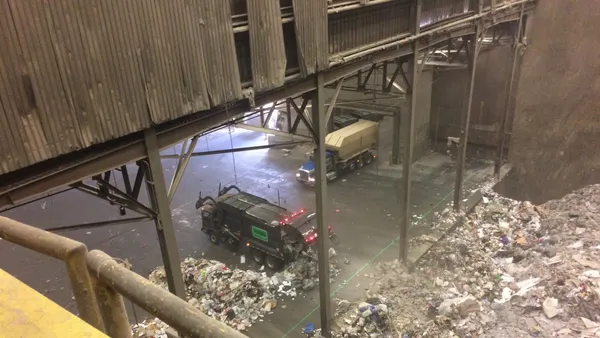To learn more about the FIRST Lego League competition, read Waste Dive's coverage here.
Dive Brief:
- A group of four eighth-graders from Ohio — the "Incredibots" — took home a $20,000 prize on Wednesday after winning the FIRST Lego League Global Innovation Award for their Styro-Filter invention.
- The Styro-Filter aims to turn Styrofoam waste into activated carbon, which can then be used to purify water. The invention is now patent-pending.
- Two runner-up teams were awarded $5,000 each for their inventions. The Robostallions of Stuart, FL invented Chipsulation, an insulation made from shredded chip bags to divert the material from landfills. The Cyber Tigers of Austin, TX invented water soluble 6-pack rings that can dissolve in the ocean, minimizing plastic waste.
Dive Insight:
Each year the FIRST Lego League challenges young minds to tackle some of the world's greatest challenges. This year, for the Trash Trek theme, 26,000 teams of students from 80 countries were asked to pick a problem relating to the waste and recycling industry, figure out what's already being done to solve the problem, and improve that solution or develop a new solution all together.
The Incredibots, who took home the winning prize, created a solution to a problem that is plaguing countries all over the world — from the United States to India.
"Earlier this year, a couple of our team members took a trip to Central America and noticed the massive amounts of Styrofoam littered on the beach. After doing more research and taking a trip to our local recycling plant, we realized that they could not recycle Styrofoam, and all the existing solutions had their limitations and flaws. This inspired us to think of a solution," said Ashton Cofer, an Incredibots team member, in an email.
In past LEGO League competitions, winning teams have been able to patent their products, manufacture them, and get royalties on the sales. The Incredibots hope that their Styro-Filter will have such success and be used industry-wide.
"We hope that our solution will provide a viable alternative to disposing Styrofoam in the trash, and at the same time help produce clean water. We also hope that our solution will inspire others to think of similar solutions and improve upon ours," Cofer said.











